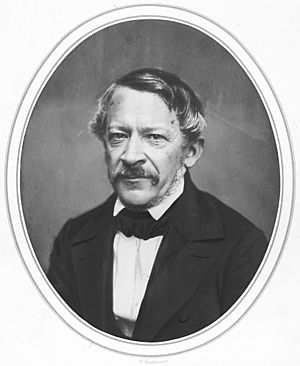Heinrich Wilhelm Dove facts for kids
Quick facts for kids
Heinrich Wilhelm Dove
|
|
|---|---|
 |
|
| Born | October 6, 1803 |
| Died | April 4, 1879 (aged 75) Berlin, Kingdom of Prussia, German Empire
|
| Nationality | German |
| Alma mater | University of Berlin University of Breslau |
| Scientific career | |
| Institutions | University of Berlin University of Königsberg |
Heinrich Wilhelm Dove (born October 6, 1803 – died April 4, 1879) was an important German scientist. He was a physicist, who studies how things work in the natural world, and a meteorologist, someone who studies the weather and atmosphere.
Contents
Early Life and Career
Heinrich Wilhelm Dove was born in Liegnitz, a city in what was then the Kingdom of Prussia. He loved learning and studied many subjects. From 1821 to 1824, he studied history, philosophy, and natural sciences at the University of Breslau.
He continued his studies at the University of Berlin and finished in 1826. After that, he started teaching. In 1828, he became a professor at the University of Königsberg. A year later, in 1829, he moved back to Berlin. There, he taught at the Friedrich Wilhelm Gymnasium, which is a type of high school.
In 1845, Dove became a full professor at the Friedrich-Wilhelms-Universität in Berlin. He was even chosen to be the rector (the head of the university) twice! This happened from 1858–1859 and again from 1871–1872. In 1849, he also became the director of the Prussian Meteorological Institute. This institute was very important for studying weather.
Scientific Discoveries
During his life, Heinrich Dove wrote over 300 scientific papers. Many of these papers explored different areas of physics. He also had a huge impact on the science of meteorology, which is the study of weather. Many people consider him a pioneer in this field.
One of Dove's main interests in meteorology was climatology. This is the study of Earth's climates and how they change. Another famous scientist, Alexander von Humboldt, also helped start this field.
Understanding Storms
In 1828, Dove made an important observation about tropical cyclones, which are powerful storms. He noticed that these storms spin counterclockwise in the Northern Hemisphere (the top half of the Earth). However, in the Southern Hemisphere (the bottom half of the Earth), they spin clockwise. This discovery helped scientists understand how storms move and behave.
Binaural Beats
In 1839, Dove discovered something cool about how we hear. He found a technique called binaural beats. This happens when you play two sounds with slightly different frequencies, one in each ear. Your brain then creates the feeling of a third, slower beat. This "beat" is not actually there in the sound waves, but your brain makes you hear it!
First Metal Detector
In 1841, Dove invented something he called the "differential inductor." This device was actually the very first magnetic induction metal detector! It used four coils of wire. Two of these coils were primary coils, and two were secondary coils.
When high-voltage electricity from special capacitors (called Leyden jars) was sent through the primary coils, it created a surge of current. This surge then created a voltage in the secondary coils. Dove wired the secondary coils so that these induced voltages would cancel each other out.
But here's the clever part: if he placed a piece of metal inside one of the glass tubes with the coils, the balance was disturbed. The professor would then receive a small electric shock, showing that the metal had been detected! This was also the first "pulse induction" metal detector.
Other Studies
Dove also studied how heat is spread across the Earth's surface. He looked at how climate affects the growth of plants. He was also the first person to measure the strength of an electric current that was created in a wire when a magnetic field around it collapsed.
Awards and Recognition
Heinrich Wilhelm Dove received many honors for his important scientific work:
- He became a Foreign Fellow of the Royal Society in 1850.
- He was a member of the Prussian Academy of Sciences starting in 1837.
- In 1853, he received the Copley Medal, a very prestigious science award.
- He became a foreign member of the Royal Netherlands Academy of Arts and Sciences in 1861.
- He was also an Honorary Fellow of the Royal Society of Edinburgh.
Places and things have been named after him to honor his contributions:
- Dove Bay in Greenland is named after him.
- A crater on the Moon, called Dove, is named after him.
- In the field of optics, a special type of prism called the Dove prism is named for him.
See also
 In Spanish: Heinrich Wilhelm Dove para niños
In Spanish: Heinrich Wilhelm Dove para niños
 | Janet Taylor Pickett |
 | Synthia Saint James |
 | Howardena Pindell |
 | Faith Ringgold |

